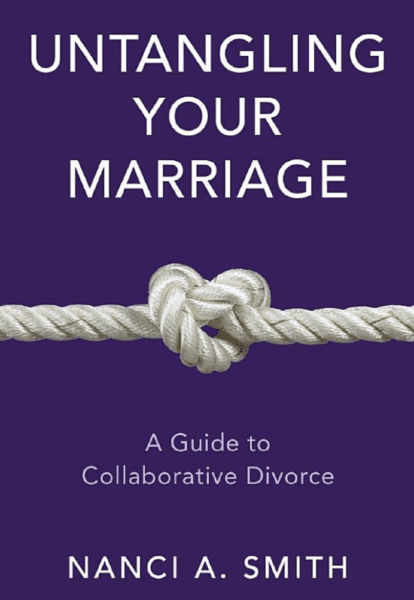
“About thirty years ago in Minnesota, two veteran family lawyers, Stuart Webb and his colleague and friend Ron Ousky, decided that they had had enough of tearing families apart through an adversarial process just so the couple could live in separate homes, set up a parenting schedule, and come to an allocation of financial resources so that both spouses could live a decent life,” writes Nanci A. Smith in her new book, Untangling Your Marriage: A Guide to Collaborative Divorce. “They decided to try something different. Each agreed that they would only settle cases through direct negotiations, with each other and the clients. They agreed not to go to court anymore.
INSTAGRAM: www.instagram.com/divorceuntangled/
They dubbed the phrase collaborative divorce; they settled cases without the need to face off in court, they felt good about themselves, and their clients appreciated their efforts…Collaborative divorce has (since) grown and evolved over time through the courage and convictions of a generation of lawyers who were willing to challenge the dominant, adversarial, and litigious divorce paradigm. Because of the efforts of these collaborative professionals across the country and the world, collaborative divorce is now recognized by the American Bar Association and state courts as a form of dispute resolution.”
Smith proves to be a trustworthy, and concise narrator to the specific concepts surrounding said ‘Collaborative Divorce’, and the titular generality of Conscious Uncoupling. She writes with a sense of candor, ease, and compassion – never doubting the reader’s intelligence, but at the same time walking hand-in-hand with them during what many would call one of the most challenging periods of their lives.
Divorce has never been an easy phenomenon, particularly in North America-based circles, but Smith shines a light on the highs and lows, plus expected complications, that never shames or juxtaposes. “Collaborative divorce is defined by the existence of a participation agreement and the disqualification clause—participants are bound by the agreement to proceed in this manner. If that bothers you, then collaborative divorce may not be the best process for you. You can still consider mediation or litigation.
This book is your guide to successfully completing the collaborative divorce process using an interdisciplinary team approach as it is commonly practiced across the country,” she states. “When you choose to engage in a collaborative divorce process, we all expect that you will treat yourself, your spouse, and the members of your team with dignity and mutual respect. You can rest assured that no one is trying to take advantage of you. You will have time and space to gather your thoughts and ask questions. The team is invested in your success.
BUY THE BOOK: www.amazon.com/Untangling-Your-Marriage-Collaborative-Divorce/dp/1538166895
We help you identify why you are here and what you hope to achieve by doing your divorce differently; we provide a place to discuss your hopes for your future relationships and financial security, and your concerns and fears; we help you collect and organize the relevant information that we need to help you generate thoughtful, practical, and durable resolutions. We assess the viability of your options; you make decisions on your time line, not that of the court, that works for both of you and your family.”
Clay Burton
